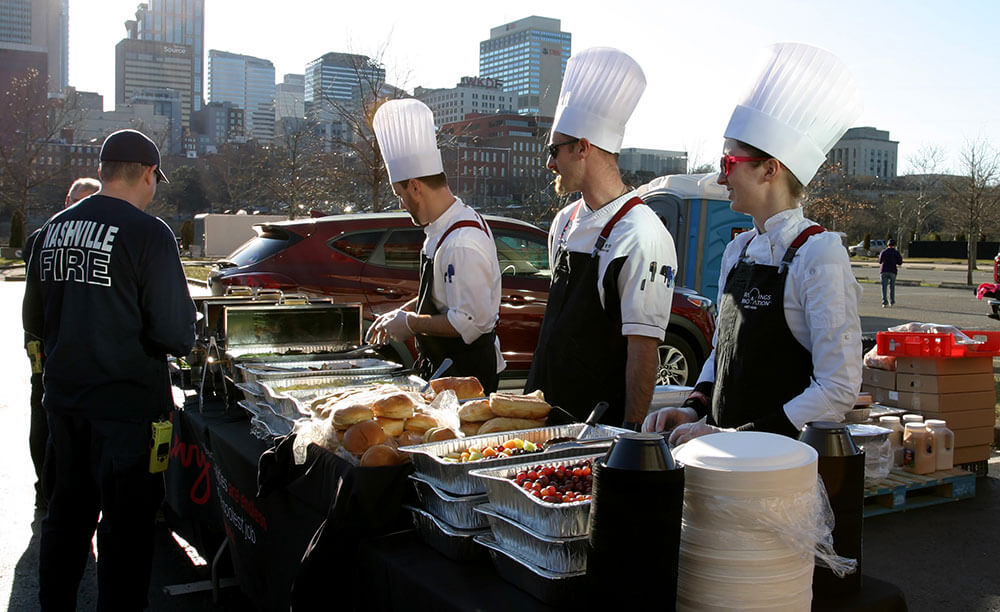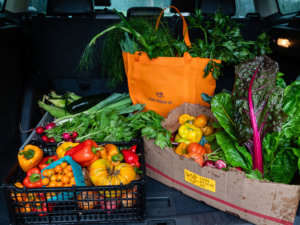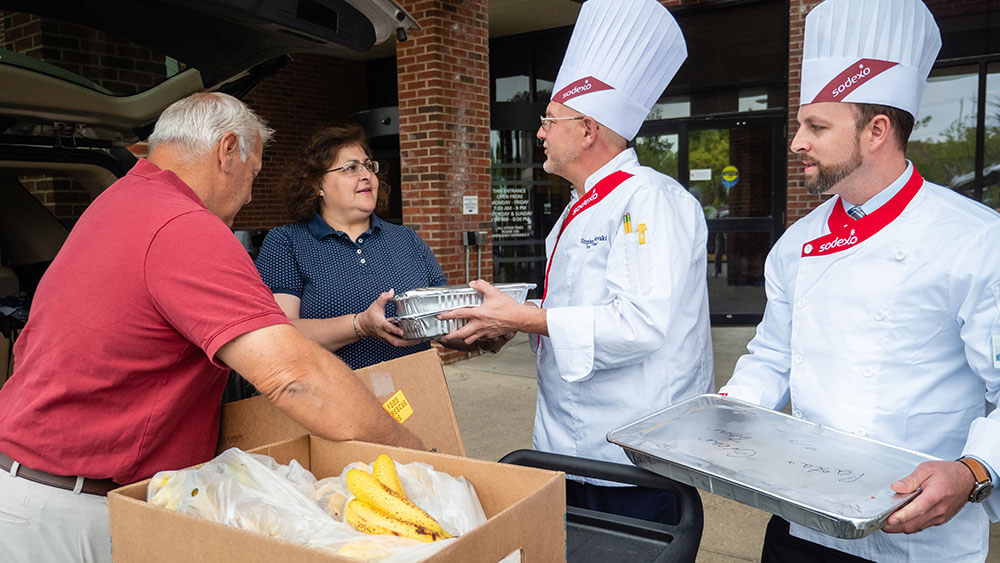
Chefs serve victims of and first responders to the Nashville tornadoes in early March. Food-service provider Levy partnered with the non-profit Food Rescue US to donate and deliver leftover food from the canceled Arnold Sports Festival in Columbus, Ohio.
Takeaways:
- Meeting planners should look to their food-service partners for ideas on donating leftover food from events canceled due to the COVID-19 outbreak or other reasons.
- The nonprofit Food Rescue US operates in 17 states, where it streamlines the logistics of donating excess food.
- There are general guidelines that dictate what can and cannot be donated. Uneaten food from a buffet, for example, is not eligible for donation.
On Feb. 29, when the U.S. officially recorded its first death from COVID-19, Zendesk was less than three days away from kicking off its global user conference, Relate, at the Miami Beach Convention Center (MBCC). At that moment, fears over COVID-19 escalated, and the team decided to err on the side of caution and cancel the three-day event, scheduled to run from March 3–5.
“The decision to cancel Relate was extremely difficult as we were looking forward to hosting our customers and partners and showcasing our latest innovations in Miami,” said Erin Lansdown, corporate communications manager at Zendesk, in an e-mail to Convene. “Given how quickly the situation was shifting and the recent cases and state of emergency announced in Florida and the new cases in Washington and California, there was also good reason to believe that many attendees could have been stranded as additional countries continue to enact travel restrictions.”
Even though the decision to cancel was a painful one, the decision about what to do with the more than 1,000 pounds of food already prepped and waiting for Relate’s 2,300 attendees was not. Back in December, Zendesk’s Relate team already had begun working with the MBCC and its food provider, Centerplate, on a strategy to reduce food waste at the conference. They made a plan to donate any excess, unopened food to local charities via Food Rescue US — a platform that matches last-minute food donations with volunteers who can pick up and deliver it to a local charity or source in need.
“We reconnected with the MBCC — who was already making plans about what additional food could be donated — so that we would donate the new amount [through] Food Rescue US,” said Todd Lienart, director, corporate social responsibility at Zendesk. The team also donated its unused carpeting to the International Rescue Committee, which plans to use it in its new Phoenix Welcome Center for Asylum-Seeking Families, and coordinated with the local restaurant that had been set up to host their off-site dinner to instead host a donation dinner for a local homelessness organization.
Zendesk also found a local artist in Miami who wants to take some of the cardboard signage and repurpose it into a piece of art, and is also working with Crayons2Computers, a local non-profits who provides teachers with supplies, to do the same.
An Opportunity Arises
That same week, organizers of the 2020 Arnold Sports Festival were facing similar challenges. The world’s largest multi-sport festival draws more than 200,000 people, including 22,000 athletes from 80-plus countries, to Columbus, Ohio, every year for four days of competitions, expos, and entertainment. On March 5, a state order closed the festival’s sporting events to public spectators, and organizers announced that they also would cancel the festival’s two expo events.
That left the Greater Columbus Convention Center (GCCC), one of the festival’s primary venues, with more than a ton of prepared food on its hands, much of which was perishable — like fruit and chicken salad. But an opportunity quickly emerged — why not take it all to Nashville, a city reeling from a devastating tornado that had hit just two days before?
“We had to move really quickly because we didn’t want it to spoil,” said Molly Dale, general manager for Levy, the food-service provider for the GCCC. The Levy team at the GCCC reached out to the Levy team at Nissan Stadium in Nashville, and Operation BBQ Relief pitched in with logistical support. Volunteers from Food Rescue US, which has a standing relationship with the GCCC, helped deliver the food along with Levy team members. On Saturday, just two days after the cancellation announcement, the team was able to reroute more than a ton of fresh food to Nashville to feed more than 2,000 victims and first responders.
Ready to Redirect
“The advice that I would give to meeting planners [facing this kind of situation] is to lean on the resources around them,” Dale said. “Often, whoever the food [-service] partner is, they have those resources at their fingertips … to be able to move at a little bit of a quicker pace.”
Even though these two events are quite different in scale, they both leaned on their food-service providers’ relationship with Food Rescue US. Currently operating in 17 states and counting, the nonprofit streamlines the logistics of donating excess food, for both the donators and the receiving agencies who serve food insecure populations.

Volunteers of Food Rescue US completed a total of 33,000 rescues in 2019.
“Our app is really the engine of our platform and allows us to coordinate all of these last-minute food rescues,” said Melissa Spiesman, vice president, national site director for Food Rescue US. For example, she said, if Food Rescue US gets “a call from a potential donor, somebody who’s had an event canceled, we’re able to match that to a number of receiving agencies. We can spread it out because usually the amounts are pretty large.” Once a donation is confirmed, the Food Rescue US team sends out an e-mail to local volunteers (they currently have about 7,500 registered volunteers around the U.S.) notifying them of the opportunity. “Usually we hear back from handfuls of people within minutes,” Spiesman said, especially on these last-minute donations.
Leaning on a resource like Food Rescue US also allows organizers and venues to take the guesswork out of which local charities would benefit most from a donation. “They do a really good job of acting as that middle person, essentially, to [help a] source who needs it most,” Dale said.
The service is free to use and also capable of handling larger donations. Earlier this year, the nonprofit rescued more than 35,000 pounds of food left over from the 2020 Super Bowl LIV in Miami. More than 37 Food Rescue US volunteers worked with NFL Green and Centerplate, the food-service provider for Hard Rock Stadium, to deliver the excess food to several local agencies, including Miami Rescue Mission, Broward Outreach Center, Broward Partnership for the Homeless, Lotus House Shelter, and Camillus House.
But small donations can be accommodated, too. “Even if somebody is canceling a meeting for eight people — if that food is already ordered and on its way to the kitchen, that food is going to be dumped,” Spiesman said. “And all that food can really make a difference.”

Food Rescue US operates in 17 states where it streamlines the logistics of donating excess food for both the donators and the receiving agencies who serve food insecure populations.
Don’t Dump — Donate
Last year, volunteers of Food Rescue US completed a total of 33,000 rescues, and the organization expects that number to increase in 2020. While most event organizers are aware that the Bill Emerson Good Samaritan Act of 1997 protects donors from liability when food is donated in good faith to a nonprofit organization, there are some general guidelines that dictate what can and cannot be donated.
“We’re able to rescue any type of food so long as it is prepared and has not been put out for human consumption,” Food Rescue US’s Melissa Spiesman said. Uneaten food from a buffet, for example, is not eligible for donation. Spiesman added that all donated food must be covered and properly handled. Items such as sheet trays of prepared food or boxes of fresh produce and protein can be rescued as well.
Jennifer N. Dienst is a writer in Charleston, South Carolina.
What Events Professionals Need to Know About COVID-19
PCMA has created a COVID-19 resources page to help event professionals find reliable information about the outbreak and to share events industry-related resources to ensure they are prepared.
